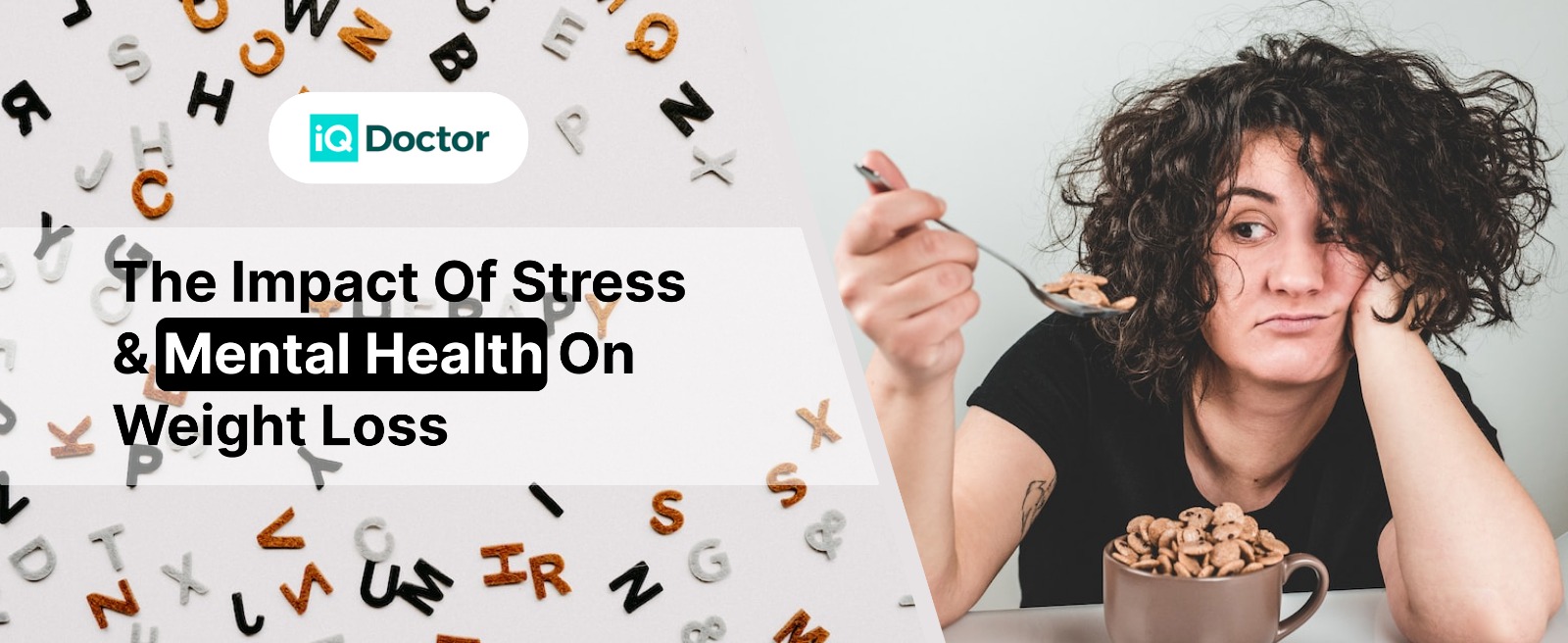The impact of stress and mental health on weight loss
20 May, 2023 | Jane Thomas - Marketing

Stress and mental health can have a significant impact on weight loss. When a person is under stress, their body releases hormones like cortisol, which can increase appetite and lead to overeating and weight gain. Stress can also lead to emotional eating, where a person turns to food as a way to cope with stress, anxiety, or depression. This can further exacerbate weight gain and make it difficult to lose weight.
Furthermore, mental health conditions such as depression and anxiety can also have a negative impact on weight loss efforts. Depression, for example, can cause fatigue, loss of appetite or overeating, and a lack of motivation to exercise or engage in healthy behaviors. Anxiety, on the other hand, can lead to overeating and binge eating as a way to manage anxious feelings.
If we discuss in more detail Here are some ways in which mental health can affect weight loss:
Hormones:
Stress can cause an increase in the hormone cortisol, which can lead to increased appetite and weight gain. Chronic stress can also disrupt the balance of other hormones that regulate metabolism, leading to weight gain. The other crucial thing which impacts weight loss is Estrogen and Testosterone Hormonal imbalances in estrogen and testosterone levels can also affect weight loss. For example, women with polycystic ovary syndrome (PCOS) may have higher levels of testosterone, which can lead to weight gain and make it harder to lose weight.
Emotional Eating:
Many people turn to food when they are stressed or anxious, which can lead to overeating and weight gain. Emotional eating can also cause a vicious cycle where the stress caused by weight gain leads to more emotional eating.
Emotional eating is when a person uses food as a way to cope with negative emotions, such as stress, anxiety, or depression. Here are a few ways in which emotional eating can affect weight loss:
Overeating
Emotional eating can lead to overeating, as a person may not be eating because they are hungry, but rather to deal with their emotions. Overeating can lead to consuming more calories than the body needs, which can lead to weight gain.
Consuming High-Calorie Foods
Emotional eaters may also be more likely to consume high-calorie, high-fat foods that are not part of a healthy diet. These foods can be comforting in the moment, but they can also be high in calories and can contribute to weight gain.
Lack of Mindful Eating
Emotional eating can also lead to a lack of mindful eating, which is when a person pays attention to their hunger and fullness cues while eating. Instead, emotional eaters may eat quickly or mindlessly, not paying attention to how much they are eating.
Negative Emotions Can Halt Weight Loss Progress
Emotional eating can also be triggered by negative emotions that arise during the weight loss journey. For example, if a person experiences a setback in their weight loss progress, they may turn to food as a way to cope with their frustration or disappointment. This can sabotage weight loss efforts and make it harder to reach weight loss goals.
Overall, emotional eating can have a significant impact on weight loss. It's important to address emotional eating as part of any weight loss journey by finding alternative ways to cope with negative emotions, such as through therapy or stress-reduction techniques like mindfulness or meditation.
Lack of Motivation:
Mental health issues such as depression and anxiety can make it harder to stay motivated to exercise and eat healthily, which can lead to weight gain.
Lack of motivation can have a profound impact on weight loss efforts. When you lack motivation, it becomes more challenging to stick to a consistent routine and make the necessary lifestyle changes for successful weight loss. Here are a few ways in which a lack of motivation can affect weight loss:
Inconsistent Exercise
Regular physical activity is an essential component of weight loss. When you lack motivation, it can be difficult to find the drive to engage in regular exercise or maintain an exercise routine. This inconsistency can hinder progress and slow down weight loss.
Poor Adherence to Diet
Weight loss often requires making changes to your eating habits and following a balanced, calorie-controlled diet. However, when motivation is lacking, it becomes easier to give in to cravings, make unhealthy food choices, or overeat. This can hinder weight loss progress and lead to weight gain or plateaus.
Difficulty Establishing Healthy Habits
Developing healthy habits, such as meal planning, cooking at home, and practicing portion control, is crucial for sustainable weight loss. A lack of motivation can make it challenging to establish these habits, as it requires consistency and effort.
Decreased Self-Care
When motivation is low, self-care practices that support weight loss, such as prioritizing sleep, managing stress, and practicing mindfulness, may fall by the wayside. Neglecting these aspects can impact weight loss progress negatively.
To address a lack of motivation in weight loss efforts, it can be helpful to:
- Set realistic and achievable goals to regain a sense of purpose and direction.
- Find a support system or join a weight loss community for encouragement and accountability.
- Focus on the positive aspects of weight loss, such as improved health and increased energy levels.
- Break down weight loss into smaller, manageable steps to make progress feel more attainable.
- Seek professional help, such as working with a therapist or a registered dietitian, who can provide guidance, motivation, and strategies tailored to your needs.
Sleep:
Stress and mental health problems can also affect sleep quality, which has been linked to weight gain. Poor sleep can disrupt the hormones that regulate appetite, leading to overeating and weight gain.
Here are a few ways in which stress, mental health problems, and poor sleep quality can affect weight
Hormonal Changes
Stress and sleep deprivation can affect the levels of hormones in the body that regulate appetite and metabolism. For example, the hormone ghrelin, which stimulates appetite, increases, and the hormone leptin, which signals fullness, decreases with poor sleep quality. This hormonal imbalance can lead to overeating and weight gain.
Increased Cravings
Poor sleep quality has also been linked to an increased desire for high-calorie, high-carbohydrate foods. When sleep-deprived, the body may crave foods that provide a quick energy boost, which can lead to overconsumption of unhealthy foods.
Reduced Physical Activity
Sleep deprivation and mental health problems can also lead to reduced physical activity levels due to fatigue and lack of motivation. This reduced activity can lead to a decrease in calorie expenditure and weight gain.
Disruption of Circadian Rhythm
Stress and poor sleep quality can also disrupt the body's circadian rhythm, which regulates many bodily functions, including metabolism. This disruption can affect the body's ability to burn calories efficiently, leading to weight gain
Medication:
Certain medications used to treat mental health conditions, such as antidepressants, can cause weight gain as a side effect.
Therefore, it's important to address and manage stress and mental health concerns as part of a comprehensive weight loss plan. This may include techniques like mindfulness, meditation, and yoga to manage stress and improve mental well-being. Therapy or counseling can also be helpful in managing mental health conditions that are impacting weight loss efforts.
By addressing stress and mental health concerns as part of a weight loss plan, individuals can improve their chances of success and achieve long-term weight loss and overall health improvements.
Reviewed By

Omar El-Gohary
The superintendent and lead pharmacist - registration number 2059792.
Omar is passionate about developing healthcare technology to empower our patients.


